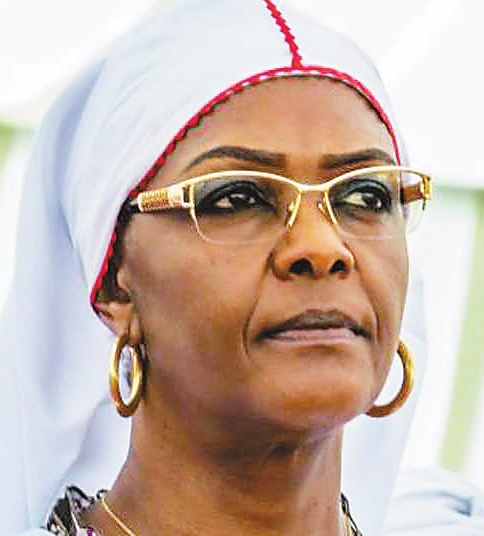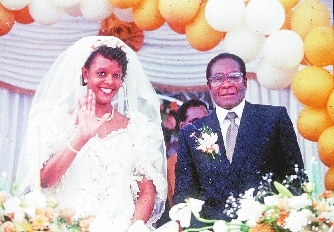


SOUTH African authorities issued an arrest warrant for Grace Mugabe, the wife of Zimbabwe’s former leader who was accused of assaulting a woman in Johannesburg last year, marking another setback for the couple, who have kept a mostly low profile since the former president was forced from office in November 2017. The warrant made public Wednesday follows a long legal process during which a South African court this year ruled that the government acted illegally in granting diplomatic immunity to Grace Mugabe when the alleged attack was first reported. Robert Mugabe, whose command over Zimbabwe once seemed impregnable, is now 94 years old and ailing. Whether Zimbabwe would assist South African authorities with any extradition request is in doubt, though the arrest warrant means Grace Mugabe would be vulnerable if she visits her sons, who stay in South Africa. She also owns a house there. Grace Mugabe allegedly attacked model Gabrielle Engels on Aug. 13, 2017, using an electrical extension cord at an upmarket hotel in the business district of Sandton. At the time, her two sons Robert Jr. and Chatunga were living in Sandton, where they had a reputation for partying. Engels, now 21, suffered cuts to her forehead and the back of her head. “We were chilling in a hotel room, and (they) were in the room next door. She came in and started hitting us,” Engels told local media last year. However, Mugabe was allowed to return to Zimbabwe despite calls for her prosecution. She traveled with her husband, who was then president of Zimbabwe and attending a regional summit in Pretoria. Robert Mugabe was ousted only a few months later after a military takeover, impeachment proceedings led by the ruling party that once backed him and large demonstrations for his removal. Zimbabwe President Emmerson Mnangagwa, Robert Mugabe’s former deputy, recently revealed Mugabe had been in Singapore for medical care and was now unable to walk because of ill health and old age. Representatives of Grace Mugabe have said that Engels was the actual aggressor in the altercation between the two. AfriForum, a South African group that represented Engels, said the court ruling that Grace Mugabe had no right to diplomatic immunity had allowed police to proceed with an investigation. “We’re now at a point where an arrest is possible,” said Kallie Kriel, the group’s CEO. “We believe that this sends out a strong message that nobody is above the law, not even if your surname is Mugabe.” Even before the arrest warrant for her, which could yet mark the end of her rags-to-riches story, it had not been a great time for Grace Mugabe. In the past years, there was the bitter feud with Mnangagwa, which resulted in her denying she plotted to poison him. Then there was the decline in both the Zimbabwean economy and her own personal popularity ratings. The two may be connected, given that her detractors like to refer to her as the “First Shopper.” She has two sons and a daughter with the former president. Libya is not the only case study to demonstrate that history is not always kind to family members who outlive a long-term authoritarian ruler. At the heart of Grace Mugabe’s extraordinary journey from struggling single mother to the most powerful woman in Zimbabwe is a love story. In the early 1990s, Grace, a young married woman who had secured a job in the president’s typing pool, found that the president kept sticking around to say hello. “He came to me and started asking about my family,” she told South African journalist Dali Tambo in 2013 in a rare interview. “He just started talking to me, asking me about my life. Were you married before, things like that … I didn’t know it was leading somewhere. I was quite a shy person, very shy.” The president wooed Grace over tea and scones, but there were a couple of obstacles to their relationship. One was the age gap — President Mugabe is 41 years older than Grace. Another was the fact that the president was already married to Sally Mugabe, who at the time had terminal cancer. “I felt a bit uncomfortable when he proposed to me since he was still married to Sally,” she said. Robert Mugabe, never a great romantic, took a practical approach. “It was necessary for me to look for someone and, even as Sally was still going through her last few days, although it might have appeared to some as cruel, I decided to make love to [Grace]. She happened to be one of the nearest and she was a divorcee herself. And so it was,” he said in the same interview. Sally died in 1992. Grace and Robert were married in 1996 in a lavish ceremony attended by 40,000 people, including Nelson Mandela. By then the couple already had two children and a third would arrive a year later. At first, as she struggled to emerge from the popular Sally’s shadow, Grace was a quiet first lady. She appeared by her husband’s side for official functions but she rarely got involved in politics herself. Publicly she focused on charity work; privately on legendary shopping expeditions. Also nicknamed “Gucci Grace,” she has a penchant for Ferragamo heels. On one spree in Paris she is widely reported to have racked up a US$95,000 bill. But the seeds of the first lady that Grace would become — more involved, more powerful — were already being sown. In 2009, British photographer Richard Jones tried to take her photograph outside a hotel in Hong Kong. She wasn’t happy. Jones alleged that he was chased down by her bodyguards, who pinned back his arms while she punched him repeatedly in the face. She has since been implicated in several incidents outside Zimbabwe: in Singapore, in Malaysia and most recently in South Africa. Outside her role as Zimbabwe’s first lady, she has also run several failed mining businesses and built her own dairy farming empire on five previously white-owned farms. The former owners had been evicted during Zimbabwe’s controversial “land reform” process. Grace Mugabe was learning from her husband, she explained. “I was very young when I started living with President Mugabe. But he was patient with me and took time to groom me into the woman that I am now,” she said in a 2012 speech. In 2014, she was slowly unveiled as a potential successor to her husband. She became head of the ruling party’s women’s league, a position that gave her a seat on the party’s all-powerful decision-making body, the politburo. She was awarded a doctorate by the University of Zimbabwe, where her husband is chancellor, reportedly just three months after enrolling, giving her the necessary academic background. The state propaganda machine began talking up her political acumen — and so did she. She started holding rallies where she would rail against the president’s perceived enemies, telling one crowd: “They say I want to be president. Why not? Am I not a Zimbabwean?” She showed her political mettle in 2014 with her campaign against then-vice president Joice Mujuru, who was a contender to succeed her husband. Grace launched sustained verbal attacks against Mujuru, accusing her of plotting to topple the president. Soon afterwards, Mujuru was ousted and later expelled from the ruling ZANU-PF party. The former first lady had the active support of ZANU-PF’s Youth League, and some politicians coalesced around her to form a faction called Generation 40 (G40) — a grouping of younger leaders that deliberately draws a distinction with the party’s old guard. But she remained deeply unpopular with wider population, who have been incensed by reports of her extravagant spending. She once told a South African television program that she is no longer concerned about what people think of her. “I have developed thick skin, I don’t even care,” she said. “My husband says ignorance is bliss.”(SD-Agencies) | 
